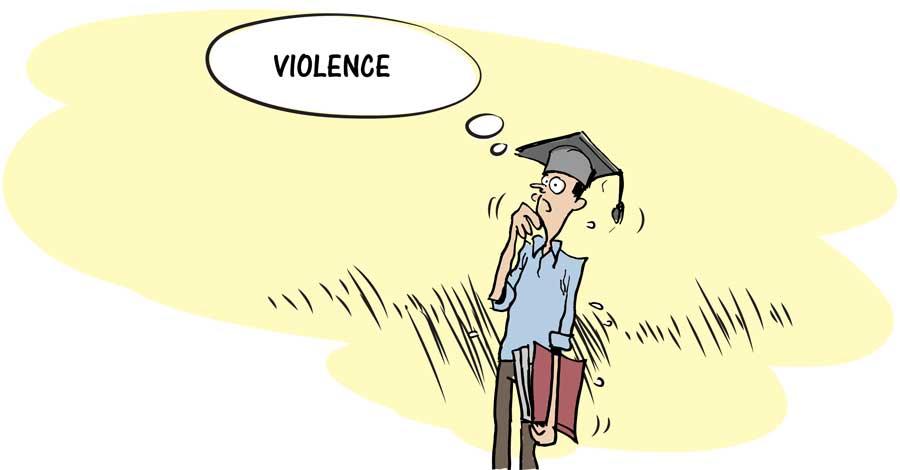16 Dec 2022 - {{hitsCtrl.values.hits}}

An assault incident involving the former Vice Chancellor of the Peradeniya University Prof. Athula Senaratne and his son made us stop and ponder how intelligent students perusing a higher education can resort to violence as a solution to a problem.
News on television picking up footage from CCTV cameras fixed at Prof. Senaratne’s residence shows that there is violence in the assailants’ genes. Or is the reason for violence some other influence?
There was a time, some years ago, when a gang operating under the name ‘Awa’ went about unleashing violence in Jaffna in typical South Indian style movies. This gang used sharp weapons and caused distress to the society; with the sword often being the weapon of destruction. Blood at a scene of crime was quintessential akin to how violence is portrayed in the South Indian movies.
Back to the incident in Sri Lanka, it was not only the Professor his son was also not spared in this incident. The latter had many blows to his back and there were many red scars that showed how severe the violence was. Television stations must also take some blame for how they show footage related to violence. A leading television station, that is harping on promoting what is ours while looking for what is new, plays frightening background music when it broadcasts violent incidents during the news bulletin. Should media sensationalise violence because they have to raise viewership in numbers and also compete with other TV stations? Don’t these types of acts (sensationalism) promote the concept violence as the answer when a dispute occurs?
Even the present regime doesn’t hesitate one bit these days to use violence when the protesters gather in a group and highlight the wrongdoings of the government. So how can the regime condemn violence by youth when it uses the same as a tool of control
The incident took place when the professor’s son got involved in a brawl after accidentally knocking down two motorbikes belonging to the undergrads at the scene of violence. The attackers mistook the son’s action- which was not intentional as claimed by him-as some form of aggression. The incident went far beyond reasonable tolerance levels and as a result 12 of them are now seeing their studentship at the Peradeniya University being suspended. As many as 300 undergrads had been involved in the incident as reported in newspapers.
From a government point of a view the head of state wanted a full report regarding the attack on the former vice chancellor and his son. This is a must and punishment must be severe on those found guilty of taking the law into their hands. If two bikes were knocked down their owners could have filed entries with the police and let the law take its course of action.
But when one considers the manner in which the past two regimes used violence to crack the whip on protesters the government too has dirty hands with blood spluttered in them here and there. Even the present regime doesn’t hesitate one bit these days to use violence when the protesters gather in a group and highlight the wrongdoings of the government. So how can the regime condemn violence by youth when it uses the same as a tool of control?
The Mahinda Rajapaksa regime used violence and made it look an ordinary happening when the state used this method to silence critics. First it was the war against terrorists and then a victorious regime enjoyed the licence to kill; going to the extremes of attacking media men and even getting teachers to kneel if anyone didn’t tore the line with their thinking.
When the elders of a country pick violence as the first response to dealing with a threat or incident the younger generation also follows suit. However, despite these shaky violent pasts, both the Pohottuwa and Grand Old Party have stuck gold when seeking reelection compared to the JVP which is still struggling to erase those bloody and violent eras in the 1970s and 1980s from the political record books of this island.
How come the Reds are never forgiven for a violent past but the violence of other lawmakers-belonging to other parties- is conveniently forgotten come election time?
09 Jan 2025 3 hours ago
09 Jan 2025 4 hours ago
09 Jan 2025 7 hours ago
09 Jan 2025 7 hours ago
09 Jan 2025 8 hours ago